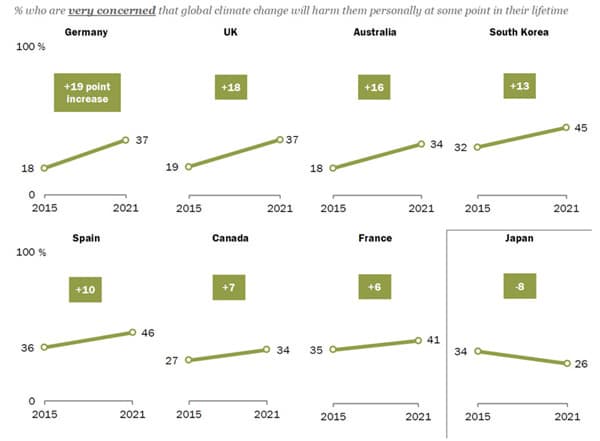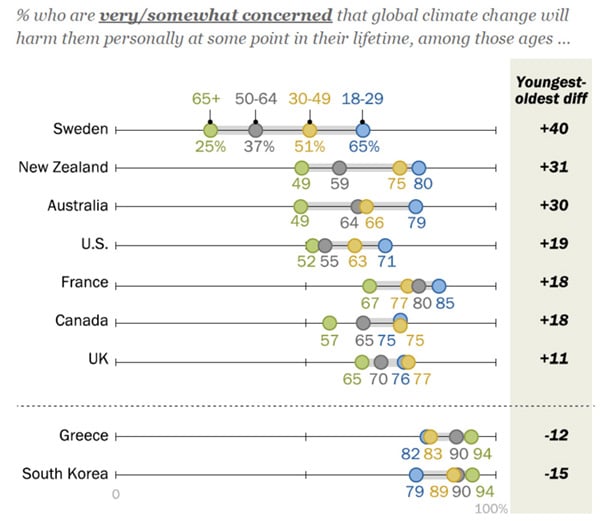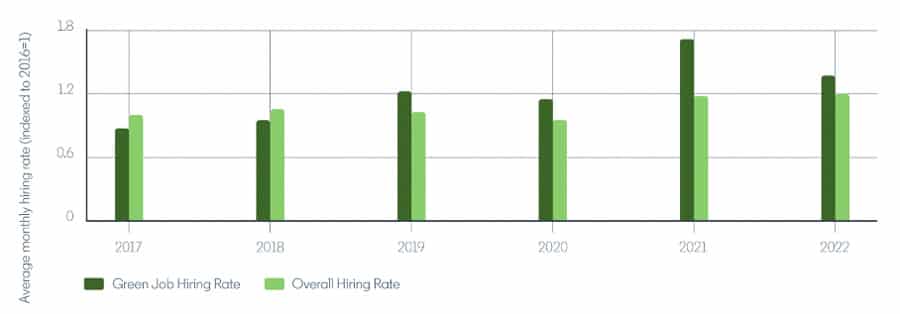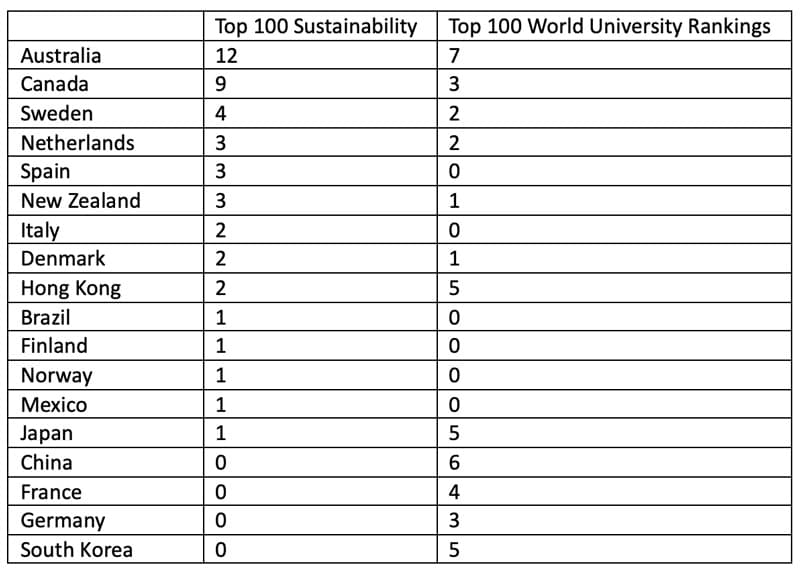Environmental sustainability as a competitive advantage in international student recruitment
- Growing numbers of prospective international students are motivated to study with environmentally conscious institutions and/or in programmes concerned with sustainability or green energy
- Major global employer surveys find that demand for “green jobs” will outpace supply in the near term
- Certain countries perform especially well in the QS World University Rankings 2023 for Sustainability
Institutions with sophisticated student recruitment strategies know that market segmentation is an important element of ensuring programmes are presented to the students most likely to be interested in them. Investopedia explains:
“Market segmentation is a marketing term that refers to aggregating prospective buyer into groups with common needs who respond similarly to a marketing action. It enables companies to target different categories of consumers who perceive the full value of certain products and services differently from one another.”
The great majority of prospective international students care deeply about quality of education and graduate employability. Beyond that commonality, other areas of expertise that can form the basis for market segments include:
- Affordability;
- Subject area (e.g., visual arts or computer science);
- Excellent environment/green energy programmes and commitment to environmentally sustainable practices.
This last area, sustainability, is the focus of this article.
QS Sustainability Rankings
In 2022, QS launched its QS Sustainability Rankings. In 2023, 700 universities made the list of the most environmentally conscious in the world.
The Sustainability Rankings include the following indicators, as well as others. (Students can filter the rankings according to which indicators they care most about.)
- "The sustainable education indicator looks at alumni outcomes and academic reputation within earth, marine and environmental sciences courses, and the availability of courses that embed climate science and/or sustainability within the curriculum. If a university has a research centre dedicated to environmental sustainability, further points are gained."
- "The sustainable research indicator assesses the university’s research activity around the United Nation’s Sustainable Development Goals and whether the government is funding research and development in this area.”
Which students fit into a “sustainability-driven” target segment?
What we might call the “sustainability-driven” segment – students who would be more interested than others in the QS Sustainability rankings, for example – is larger than you might expect.
It includes students in advanced economies who have the privilege of not living in poor households. Those students have the bandwidth to worry more about climate change than students who have more immediate priorities for study abroad (such getting a job that will lift them out of poverty). This relatively affluent segment is clearly illustrated in the following two screen shots of charts created by the Pew Research Centre. The charts are based on a survey conducted in 2021 in 17 advanced economies in North America, Europe, and the Asia-Pacific region.


The “sustainability-driven” segment is larger than relatively privileged students in advanced economies, however. This is because demand for experts to fill “green” jobs is rising and will keep rising. In this way, institutions known for their excellent performance on the QS Sustainability rankings can also appeal to students most motivated by graduate outcomes.
The link between sustainability and graduate outcomes
The World Economic Forum’s Future of Jobs Report 2023 found that “nearly a quarter of all jobs (23%) globally will change in the next five years.” Some jobs will face elimination due to technological advances removing the need for human expertise, while others will be more in demand. Specifically, the report found that:
“Investment in the green transition, as well as increasing consumer awareness of sustainability issues will create new opportunities. Roles from renewable energy engineers, solar energy installation and systems engineers to sustainability specialists and environmental protection professionals will be in high demand.”
Overall, feedback from 803 companies – “collectively employing more than 11.3 million workers – across 27 industry clusters and 45 economies from all world regions” reveals that these are the fastest growing roles relative to their size today:
- AI and Machine Learning Specialists
- Sustainability Specialists
- Business Intelligence Analysts and Information Security Analysts
- Renewable Energy Engineers
- Solar Energy Installation and System Engineers
The World Economic Forum notes that:
- “LinkedIn data shows hiring for green jobs consistently outpaces overall hiring.
- Just over 1 in 4 adults say sustainability is one of their top non-negotiables for a new job.
- Overall, job postings requiring green skills have grown by 8% annually over the past five years, but the share of green talent has only grown by roughly 6% each year, meaning there is a skills gap that needs to be closed.”
The Forum estimates that “the transition to clean energy is expected to generate 13.3 million new jobs globally by 2030, offsetting the 2.7 million jobs expected to be lost in fossil fuel sectors.”

LinkedIn’s Global Green Report 2022 also points out that green skills are not at all limited to roles such as renewable energy experts. Multiple industries require workers with green skills.

Top 100 in the QS 2023 Sustainability Rankings
For years, US and UK universities have dominated the Top 100 QS World University Rankings. For example, in 2023, there were 27 US universities in the Top 100 and 17 UK universities in that top tier, followed by Australia (7); China (6); Hong Kong, South Korea, and Japan (5 each); France (4); and Germany and Canada (3 each).
When we look at the Sustainability Rankings, however, we see a different organisation. The US and UK still dominate, with 30 and 20, respectively, in the top 100. But if you look at the table below, you can see that other countries punch above their weight in the Sustainability Rankings compared with the overall World University Rankings – and some do less well in the Sustainability Rankings than they do overall.
For example, Australia and Canada do even better in the Sustainability rankings than in the World University Rankings. Sweden, Spain, Italy, and Denmark are also notable performers in the Sustainability Rankings. New Zealand is a highlight: Of eight universities total in the country, three make the Top 100 and all eight make the full list. By contrast, China, France, Germany, and South Korea do not appear in the Top 100 for sustainability, though China and Germany perform well outside that top tier.

Top 10 Most Sustainable Universities (QS 2023)
- University of California, Berkely (US)
- University of Toronto (Canada)
- University of British Columbia (Canada)
- University of Edinburgh (UK)
- University of New South Wales (Australia)*
- University of Sydney (Australia)*
- University of Tokyo (Japan)
- University of Pennsylvania (US)
- Yale University (US)
- University of Auckland (New Zealand)
*Tied for 5th place.
Destination marketing implications
The QS Sustainability Rankings suggest that environmental programmes and commitment to sustainability is a niche area of competitive advantage for certain countries outside the “Big Four” English-speaking destinations, perhaps especially for New Zealand and Spain.
In general, institutions everywhere could appeal more to international students if they upped their environmental game. A 2019 QS survey of close to 4,000 students found that:
- Only 35% agreed strongly that universities care about the environment;
- 91% felt universities could do more to reduce the environmental impact of their institution’s operations;
- 79% would be more likely to choose a degree that helped to teach them how to reduce their environmental impact;
- 98% agreed that universities should publicise their sustainability efforts on social media channels, on the institutional website, at student fairs and events, and in their brochures.
For additional background, please see:
















